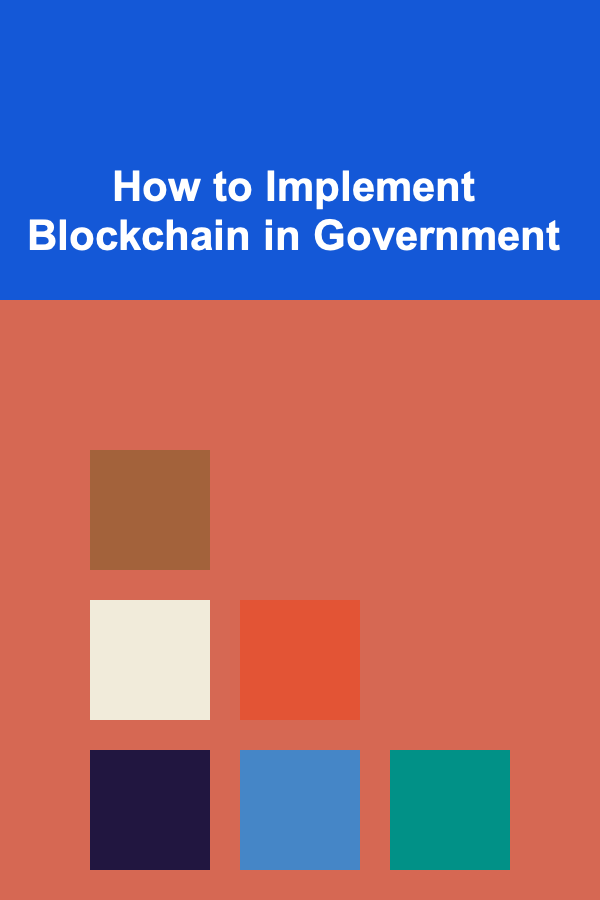
How to Implement Blockchain in Government
ebook include PDF & Audio bundle (Micro Guide)
$12.99$9.99
Limited Time Offer! Order within the next:

Blockchain technology has garnered significant attention in various sectors, particularly in finance and supply chain management. However, its potential applications extend far beyond these industries. One of the most promising areas for blockchain is government operations. Blockchain's decentralized nature, security, transparency, and immutability offer potential solutions to long-standing inefficiencies in government systems. In this article, we explore how governments can implement blockchain technology to improve various aspects of governance, including public records, elections, public services, and compliance.
The Role of Blockchain in Government
Blockchain technology, fundamentally, is a distributed ledger that securely records transactions across a network. Unlike traditional centralized databases, blockchain is decentralized, meaning that data is not stored in a single location but across multiple nodes in the network. This decentralized nature is essential for ensuring transparency, reducing fraud, and increasing accountability in government operations.
At its core, blockchain ensures that once data is recorded, it cannot be altered or tampered with, providing an immutable record. This property is valuable in government processes that require trust, security, and transparency, such as elections, land ownership, and public contracting.
Governments around the world are beginning to explore and experiment with blockchain technology in areas such as digital identities, supply chain tracking, voting systems, and financial transactions. However, widespread adoption remains a challenge due to regulatory concerns, security risks, and the need for massive infrastructure changes.
Use Cases of Blockchain in Government
Blockchain technology has the potential to address several challenges that governments face, including inefficiencies, corruption, lack of transparency, and outdated legacy systems. Below are several key areas where blockchain can be applied in government:
1. Digital Identity Management
Digital identity systems are vital for modern governments. They serve as the foundation for accessing various public services and benefits. However, existing systems often face security challenges, such as identity theft and fraud, and are usually fragmented across different governmental departments. Blockchain can streamline and secure digital identity management.
By using blockchain to store personal data, governments can create secure, decentralized identity systems that are resistant to tampering and fraud. Blockchain-based digital IDs would allow citizens to control their personal information, granting permission to access or share specific data with government services. This reduces the risk of identity theft and simplifies access to government services.
For instance, Estonia, a leader in digital governance, has implemented blockchain technology to manage its digital identity system. Citizens can access government services, vote, sign documents, and more, all using a secure blockchain-based identity.
2. Election Transparency and Integrity
Elections are the cornerstone of democracy, yet many election systems are vulnerable to fraud, hacking, and mismanagement. Blockchain can provide an immutable, transparent ledger for electoral processes, from voter registration to vote counting.
A blockchain-based voting system would ensure that each vote is securely recorded and cannot be altered. Blockchain's transparency allows citizens to verify that their vote was counted, thereby increasing trust in the election process. Additionally, blockchain can facilitate remote voting, which is particularly useful in regions with limited access to polling stations.
Governments could implement blockchain in elections to eliminate voter fraud, reduce administrative costs, and ensure a higher level of public confidence in the results. Countries like Switzerland and the United States are exploring blockchain-based voting systems to improve election transparency.
3. Public Records and Land Title Management
Governments often maintain large databases of public records, including property titles, land ownership, birth certificates, and other official documents. Traditional systems of managing these records are often centralized, prone to errors, and susceptible to corruption. Blockchain offers a decentralized and secure alternative for record-keeping.
By using blockchain to manage public records, governments can ensure that these records are tamper-proof, transparent, and accessible. For example, blockchain can be used for land title management, where each property transaction is recorded on a public ledger, ensuring the accuracy of ownership records and preventing fraudulent land deals.
Countries like Georgia have already implemented blockchain technology for land title management, allowing citizens to access and transfer land ownership records securely.
4. Transparent Public Procurement and Contracting
Public procurement and contracting processes are often opaque and prone to corruption. Governments around the world spend billions of dollars annually on procurement contracts, but many of these processes lack transparency, leading to inefficiencies and unethical practices.
Blockchain can be used to create transparent and auditable procurement processes. By recording all procurement activities on a blockchain, governments can ensure that contracts are awarded fairly, prices are transparent, and the performance of contractors is monitored. Blockchain can also be used to automate processes through smart contracts, ensuring that funds are only released when predefined conditions are met.
This level of transparency reduces the potential for corruption and ensures that taxpayer money is spent efficiently. By adopting blockchain for public procurement, governments can increase accountability and trust with citizens.
5. Financial Transactions and Budgeting
Governments handle massive amounts of financial transactions daily, including tax collection, disbursements, and budgeting. Blockchain can be used to streamline these processes, ensuring accuracy, transparency, and security.
By adopting blockchain for financial transactions, governments can reduce errors and fraud while simplifying the auditing process. Blockchain can ensure that all transactions are traceable and transparent, providing real-time insights into government spending. Furthermore, blockchain's ability to automate financial processes through smart contracts can reduce administrative costs and improve efficiency.
The use of blockchain for budgeting and financial management also increases accountability, as citizens can track how public funds are allocated and spent. For example, the United Arab Emirates has implemented blockchain to manage government payments, making financial transactions more transparent and reducing administrative overhead.
6. Public Health and Healthcare Systems
Blockchain can also play a critical role in managing public health systems. From tracking the distribution of medical supplies to managing patient records, blockchain can provide transparency and security in healthcare operations.
By using blockchain to store patient data, governments can ensure that health information is securely shared between authorized healthcare providers while protecting patient privacy. Blockchain can also track the supply chain of medicines, ensuring that pharmaceuticals are authentic and not counterfeit.
Additionally, blockchain can be used to manage health insurance claims, simplifying the claims process and ensuring that funds are allocated correctly. The transparency offered by blockchain can also help track public health initiatives and improve the allocation of healthcare resources.
7. Combating Corruption and Fraud
One of the most significant benefits of blockchain technology in government is its ability to combat corruption and fraud. Blockchain's decentralized, transparent, and immutable nature ensures that all records are secure and cannot be altered or falsified.
Governments can use blockchain to track the flow of public funds, monitor government spending, and ensure that contracts and procurement processes are conducted fairly. By creating an immutable record of transactions, governments can increase accountability and reduce the opportunities for corruption.
For example, the World Bank has advocated for the use of blockchain to combat corruption in the public sector, particularly in areas like public procurement, voting, and financial transactions.
Challenges in Implementing Blockchain in Government
While the benefits of blockchain are clear, governments face several challenges in implementing this technology. Some of the key obstacles include:
1. Regulatory and Legal Concerns
Blockchain's decentralized nature presents significant regulatory challenges. Many governments have not yet established clear legal frameworks for blockchain-based transactions, and there are concerns about how blockchain interacts with existing laws and regulations. For example, how do governments ensure that blockchain-based transactions comply with data protection laws like the General Data Protection Regulation (GDPR) in the European Union?
Governments must establish clear regulations that address issues such as data privacy, security, and the legal validity of blockchain-based records.
2. Infrastructure and Technological Challenges
Implementing blockchain requires significant infrastructure changes. Governments must invest in technology, develop blockchain platforms, and train employees to manage and maintain blockchain systems. This can be a significant financial and logistical challenge, particularly for governments in developing countries.
3. Security and Cybersecurity Risks
Although blockchain is known for its security, it is not immune to cyberattacks. Governments need to ensure that blockchain networks are protected from hacking and other cybersecurity threats. Furthermore, the implementation of blockchain requires addressing issues such as access control, encryption, and data privacy.
4. Resistance to Change
Governments are often slow to adopt new technologies, and blockchain is no exception. There may be resistance from bureaucrats, politicians, and the public who are unfamiliar with blockchain or wary of its implications. Building trust in blockchain technology and educating stakeholders will be critical for successful implementation.
5. Interoperability with Legacy Systems
Governments typically rely on legacy systems to manage various aspects of governance. Integrating blockchain with existing systems can be challenging, particularly when those systems are outdated or incompatible with blockchain technology. Governments will need to develop strategies for ensuring interoperability between blockchain and legacy systems.
Conclusion
The potential benefits of implementing blockchain technology in government are vast, from improving transparency and reducing corruption to streamlining public services and financial transactions. Governments worldwide are beginning to explore how blockchain can improve their operations, and some early adopters are already seeing success. However, the path to widespread adoption of blockchain in government will require overcoming significant challenges, including regulatory concerns, technological infrastructure, and resistance to change.
To successfully implement blockchain, governments must develop clear regulations, invest in the necessary infrastructure, and educate stakeholders on the benefits and risks of blockchain technology. With proper implementation, blockchain has the potential to transform governance and create more transparent, efficient, and accountable government systems.

How to Incorporate Eco-Friendly Decor into Your Holiday Season
Read More
How to Organize Your Video Game Collection
Read More
How to Live Debt-Free: A Comprehensive Guide to Financial Freedom
Read More
How To Discuss a Movie's Costume Design
Read More
How to Deal with Bears and Other Large Animals
Read More
Photography Composition: A Step-by-Step Manual
Read MoreOther Products

How to Incorporate Eco-Friendly Decor into Your Holiday Season
Read More
How to Organize Your Video Game Collection
Read More
How to Live Debt-Free: A Comprehensive Guide to Financial Freedom
Read More
How To Discuss a Movie's Costume Design
Read More
How to Deal with Bears and Other Large Animals
Read More